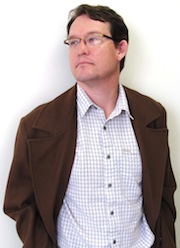 The next WATCH talk, called Welcome to the Panopticon(s) is Thursday, June 16th, 2016 from Noon-1pm EDT.
The next WATCH talk, called Welcome to the Panopticon(s) is Thursday, June 16th, 2016 from Noon-1pm EDT.
The presenter will be Nicholas Weaver. He received a B.A. in Astrophysics and Computer Science in 1995, and a Ph.D. in Computer Science in 2003 from the University of California, Berkeley. Although his dissertation was on novel FPGA architectures, he also focused on computer security, including postulating the possibility of very fast computer worms in 2001. He joined the International Computer Science Institute (ICSI) in 2003. His primary research focus is on network security, notably worms, botnets, surveillance, and other internet-scale attacks, and network measurement. Other areas have included both hardware acceleration and software parallelization of network intrusion detection, defenses for DNS resolvers, and tools for detecting ISP-introduced manipulations of a user’s network connection.
Abstract
Quietly, almost without notice, our digital and physical worlds turned into a series of panopticons, a network of both private companies and governments intent on monitoring everything. They all have adopted a similar solution: Their objectives require the ability to target anybody (either for advertising or intelligence), yet as they don’t know who they may wish to target at time of collection, they have chosen to collect data on everybody.
The tracking takes place in various forms, from elements and advertising on the page, to companies providing profiles and lists, to passive surveillance and active censorship of networks by governments and potentially criminals. These technologies are not purely passive but can also be used to exploit targets.
By building our own systems (or assigning them as homework), developing techniques to monitor and mitigate tracking, and participating as customers of private industry we can gain insights into how they work and the nearly invisible watchers affecting our modern world.
The talk will be held in Room 110 at the National Science Foundation in Arlington, VA. No RSVP is necessary, and no visitor badges are required. It will also be webcast; you can register here.









